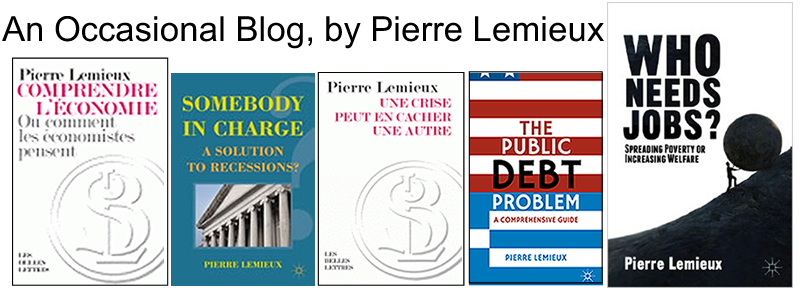From tonight’s Financial Times: “Colin Dudgeon, a student at University of New Hampshire Manchester, said he had been choosing between Mr Trump and Mr Sanders but ultimately went with Mr Trump because he believed the property billionaire needed his help more. ‘They’re two sides of the same populist coin,’ he said. ‘I wanted to stick the finger to the establishment.'” Poor little guy! He still has some non-romantic studies and thinking to do about politics. Trump does not need his help at all. And were it not for this Financial Times story, nobody would have noticed his finger to the establishment.
Author Archives: Pierre Lemieux
What Would Happen to Taxes if Cash Were Banned?
Here is a little exercise in Public Choice economics: If a government banned cash (as some are proposing), what would happen to its tax rates? Answer: they would increase as the cost of tax resistance would be lower and Leviathan would take advantage of this. On this topic, see my article “The Economics of Tax Dodging” in the Library of Economics and Liberty. The same would happen to a lesser extent if the size of large denominations is further restricted.
The Modernity of Say’s Treatise on Political Economy
Does a foreign tourist who spends $2,000 in America bring $2,000 in benefits? Of course not. But this was not always obvious. In fact, it is still not obvious to many of our contemporaries. But it was already well explained by Jean-Baptiste Say in his book A Treatise on Political Economy, first published in 1803. Say explains that, for his $2,000, the tourist obtains the equivalent value in goods and services, and it is just as if he had imported goods worth $2,000 to wherever he lives. It is an exchange like any other exchange of something for something else, from which each party to the exchange benefits, but nobody gives away money. Continue reading
Chomsky and Competitive Team Sports
Chomsky apparently does not like competitive team sports. He must hate the Super Bowl. I am not myself a fan — except for the advertisements. Continue reading
Why We Don’t Need Jobs
My new book,  Who Needs Jobs? Spreading Poverty or Increasing Welfare, is just out at Palgrave Macmillan. In this book, I explain why jobs are costs, not benefits; and why, consequently, we need as few of them as possible. I also explain the economic concepts necessary to understand this (rather standard) economic result, so the book is accessible to the lay reader. It may even be considered as an introduction to the economic way of thinking.
Who Needs Jobs? Spreading Poverty or Increasing Welfare, is just out at Palgrave Macmillan. In this book, I explain why jobs are costs, not benefits; and why, consequently, we need as few of them as possible. I also explain the economic concepts necessary to understand this (rather standard) economic result, so the book is accessible to the lay reader. It may even be considered as an introduction to the economic way of thinking.
You can order the book from Amazon.com, from Palgrave Macmillan, or from your favorite brick-and-mortar library.
Perhaps after reading it you will want to leave a comment on Amazon?
Duncan Black on Lewis Carroll
Ducan Black (1908-1991) was an economist who made important discoveries in the theory of elections: the median-voter theorem and, rediscovered after Condorcet, the paradox of voting. Charles Dodgson (1832-1898), a.k.a. Lewis Carroll, was a mathematician who explored the same field, although he is better known for his literary work, mainly Alice’s Adventures in Wonderland.
Here is a remarkable observation by Black Continue reading
Obama and the Seventh Century
I cannot get excited against air strikes on 7th-century violent barbarians persecuting civilian populations. However, I believe any supporter of liberty must get excited against Barack Obama when he says: “I don’t want to get in the business … of being the Kurdish air force.” (Financial Times, August 9, 2014).
Who does he think he is? Does he think he is an airforce?
The conceit of rulers, so-called democratic, is despicable, but alas symptomatic of their power.
Something Troubling in James Buchanan’s Theory
Just when I first read Buchanan’s The Limits of Liberty (1975) 30 years ago, I find the following intriguing or troubling:
In the model incorporated here … I allow quite explicitly for personal inequality in the natural equilibrium, the anarchistic base from which primal disarmament contracts are conceptually negotiated. … [T]he establishment of positive claims to stocks of goods or endowments may not be possible until and unless some unilateral transfers are made. This potential for transfer allows us to introduce an additional dimension of adjustment which may possibly facilitate the reaching of agreement among parties in contract. …
[C]ertain “exchanges” of resources endowments of goods and behavioral constraints may be necessary before clearly acknowledged ownership imputations are possible. (pp. 92-3)
The Santa Barbara Killings
A few hours before Jews were slaughtered in Belgium, a young madman was shooting and knifing people of his age in California. Besides the fact that the two killings happened in a gun-free zone, there seem to be few similarities between the two criminal acts. Continue reading
Anarchy and the Limited State
One can argue for total anarchy if it is the only stable equilibrium that is acceptable on the continuum from total anarchy to the total state. Note that both total state and total anarchy are stylized concepts, which can only be approximated in reality. Note also that stability has a time dimension. During history, neither near-total state nor near-total anarchy has been stable for more than a few centuries. One could venture the claim that total anarchy would be stable, but it does not seem more a stretch of the imagination to make the same claim for a classical liberal, limited state.
